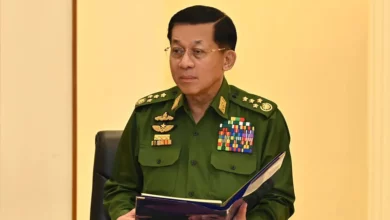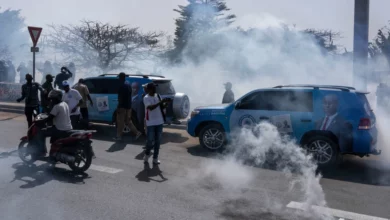According to a recent statement by a prominent member of the Egyptian junta (Major General Mamdouh Shahin), Mubarak could not find anybody but the Supreme Council of the Armed Forces (SCAF) to hand his powers to. This latest power transfer was thus not too different from those that preceded it. Indeed, it must have seemed most natural for the besieged president to bequeath power to the institution from which he had effectively inherited it.
The puzzling bit was the almost spiritual, spontaneous fusion of people and army following last winter’s uprising. This cannot be entirely explained in terms of rational considerations (for example, the military’s relatively neutral role during the revolt), but primarily via impulsive reactions learned during six decades of uninterrupted military-dominated rule — the longest, to my knowledge, in contemporary history. The lingering values and norms learned thus can also help explain the severe difficulties the liberal-secular forces are encountering in producing credible and effective leadership, as well as the relative success of the Islamists.
During those decades, Egyptian society morphed into a makeshift militarized structure, where projections of power and prestige, pageantry and pomp, utterly outweighed rational principles of open debate, universal rights, the autonomy of the individual and the rule of law. This value system trickled through all levels of society, turning even mundane daily encounters into unmitigated power struggles, resolved through a hierarchical order. Individuals acted either as dominant or submissive depending on the balance of power, prestige and authority — which could be either real or be alluded to through symbolic shows of "seriousness," severity and proximity to actual power. This order is informal, and the relevant relations are often not immediately apparent — hence the daily chaotic struggles plaguing contemporary Egypt — but once the hierarchy of a given encounter was fixed, the adherence to the norms was strict.
Since the military ranks highest in this system, it seems straightforward that no independent political figures could acquire enough support to seriously negotiate a power transition with the junta. In fact, it appears that the leading political figures themselves could not envisage an alternative situation. The only perceptible challenge, outside the press, came from the activists who continued to congregate in Tahrir Square. But they too could never produce any serious leadership. On the contrary, their countless "million man" marches, ridden with myriads of conflicting demands, seemed to implicitly delegate to SCAF and its interim government the power to tackle issues that should be the long-term concern of elected governments.
There were exceptions, of course. The case of ElBaradie comes to mind. ElBaradie had long lived and worked outside militarized Egypt, and therefore kept much of his independence. But this also meant that he lacked the proper aura of locally produced power, pomp and prestige, his Nobel Prize notwithstanding.
In contrast, the Muslim Brotherhood accepted and exploited the existing perceptions. It fused a severe aura associated with the sanctity of religious symbols, with quasi-military shows of discipline and strength and actual rapprochement with the ruling military institution — images and associations that helped complement its newly acquired formal legitimacy.
On 23 July, the 59th anniversary of the Free Officer’s Coup, and as the secular activists were being crushed, beaten and dispersed in Abbasseya by security forces and local residents during their aborted protest march to the SCAF's headquarters, the Brotherhood was feting the inauguration of its new political party with a gala reception. The legitimizing congregation included the interior minister, who had to leave the gathering early in order to "deal" with the demonstrations.
More recently, after instigating massive demonstrations protesting proposed constitutional principles that enshrined the civic nature of the Egyptian state and formalized the military’s special status in it, the Brotherhood stood back as secular activists (and many ordinary people) battled security forces for days on end, losing dozens of members and hundreds of eyes. Despite the brutal crackdown, the Brotherhood held firm to its newly rejuvenated implicit alliance with the junta.
Throughout the latest conflagration, the SCAF and the Brotherhood accused the liberal activists of inciting societal chaos and attempting to sabotage the scheduled elections, which the Brotherhood wanted at any cost, even after General Shahin explicitly attested that the resulting parliament would be virtually powerless. Indeed, whatever the powers of the upcoming parliament, it is hard to overestimate the importance of the elections, since their results, like those of the referendum, will assume the role of a powerful rhetorical tool, strengthening the hand of those who come out on top and legitimizing all sorts of maneuvers. The outcome may thus further consolidate, stabilize and formalize their relationship with the military.
This, in a sense, would represent a resumption of the short-lived alliance that existed between the Brotherhood and the July 1952 junta, most of whose officers (including Nasser and Sadat) were either Brotherhood members or sympathizers. That alliance was built on a joint rejection of the ethos of the relatively pluralist political system, open society and cosmopolitan elites of pre-1952 Egypt, a country whose liberal heritage seems to have inspired the society that transpired in Tahrir.
The subsequent struggle for power between the Brotherhood and the Officers stemmed from their rejection of difference or diversity, rather than from fundamentally incompatible visions. Given that the military is not currently interested in direct governance, but in safeguarding its special status and economic privileges, an open rift of the sort that materialized after 1952 is less likely, and Egypt may be headed toward a (north) Sudanese type military-Islamist system.
Other scenarios include a disastrous Algeria type clash between the Islamists and the SCAF, which may materialize if the former’s demands breach a certain threshold, especially given the rising strength of the ultra-conservative Salafists. In any case, the SCAF’s behavior over the past ten months makes it quite clear that they will not easily disappear from the political scene, a state of affairs many Egyptians will tolerate because of learned perceptions that reframe and minimize the significance of repeated SCAF failures.
Equally clear — given the large number of people who ignored calls emanating from Tahrir for a boycott of the elections, and the almost total electoral failure of parties representing the Tahrir revolutionaries — is that the revolutionaries are still seen as leaderless lightweights, seeking elusive instant emancipation while lacking the attributes for serious action. This perception applies to varying extents to all liberal forces. And this will remain the case as long as no confident and convincing liberal leadership steps up.




